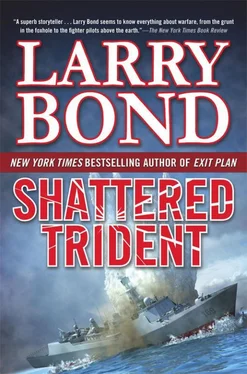The Vietnamese admiral stood and bowed slightly. “The Socialist Republic of Vietnam is honored to join our cause to yours.”
26 August 2016
By Water
Halifax, Nova Scotia
Mac tried to keep a regular schedule, stopping in the late evening. At his age, he felt a late night much more than he used to. But he loved communicating with friends scattered all over the globe, sharing their interests and knowledge. Sometimes it was hard to stop.
Threads of a dozen conversations passed through the keyboard, and Mac often imagined himself playing ping-pong with his correspondents, but instead of balls, batting information back and forth. It was a good game, and in the end both players won.
From: IanK457
To: Maritime Losses
Subj: Loss of Vinaship Sea
Mac,
Reports at Lloyd’s of London during the period of 17–20 August include only one incident in the region. The South Korean–flagged container ship Hanjin Malta sighted a column of smoke over the horizon at 1349 local on 18 August. Proceeding to the scene, she sighted debris at 1447 local at 11°02′ lat, 112°35′ long. No survivors, or clues to the identity of the vessel.
Ian
Mac studied the e-mail, reading it through twice. He wished he could track down the captain of Hanjin Malta and ask him about the “column of smoke.” That sounded like an explosion, and a big one. How high had the column gone? How far away had they been from the victim? The report didn’t list Hanjin Malta ’s starting location, but it had taken her almost an hour to reach the scene, presumably at her best speed.
That he could work with. He called up her particulars. Motor Vessel Hanjin Malta, call sign D977, length 289 meters, beam 32 meters, maximum speed 16.7 knots, built in…
He could ignore the rest. The container ship had been at least fifteen nautical miles away from the unfortunate vessel, which meant a column, what, a hundred, two hundred feet high? At least.
Mac was familiar with explosions at sea, although he’d never been in the military. If you cared about the sea, and you lived in Halifax, you knew about the December 1917 collision between the relief ship SS Imo and SS Mont-Blanc, carrying thousands of tons of TNT, picric acid, and guncotton. The force of the explosion had been calculated at three kilotons. They’d heard it on Cape Breton, over two hundred miles away.
It killed two thousand people, as well as leveling most of the town. That smoke column had ascended to twenty thousand feet, but an explosion of “only” a few hundred feet still meant tons of explosive, enough to shatter the hull of most vessels, including this one, obviously. And an explosion that big could not be caused by coal dust.
But was it Vinaship Sea ? He pulled up a digital chart and plotted the freighter’s track, based on her departure time, then started measuring. Her reported position was hundreds of miles from the site of the explosion reported by Hanjin Malta . But on the chart, Mac could see that the distance along Vinaship Sea ’s track seemed the same as the distance from Ho Chi Minh City to the explosion when backtracked two days. This proved nothing, but still, two unexplained ship losses, closely related in time, and in the same region strained credibility.
Why hadn’t Vinaship Sea ’s owners made the connection? Marine losses were widely reported in the trade journals and on the Web. And one would think her owners would want to explain the loss of a vessel worth hundreds of millions of dollars.
If Vinaship Sea had been hijacked without making a call for help, which seemed unlikely, that would explain her position. But then what had blown her up? He wanted to solve the riddle, but part of him loved the mystery.
He made a new entry in Bywater’s Blog, titled “Two Mysteries or Just One?” He laid out all the known details, and started asking questions. “The cause of Vinaship Sea ’s loss remains unexplained. Why are there no reports of her being in distress along a heavily traveled sea lane? Instead, a second (reported) loss has appeared, with gross cause (explosion) and location explained, but no company or nation has stepped forward to claim the casualty. Rough calculations indicate the cargo included at least four tons of high explosive or its equivalent, possibly much more.”
Mac stopped the entry there. He didn’t need to mention “arms smuggling.” It was an obvious, if fantastic possibility. It could easily be something more prosaic, but much more complicated. And even if it was arms smuggling, what made them explode?
His nautical investigation had carried him to almost two in the morning. Then it took him a while longer to fall asleep, his mind still searching for new possibilities.
* * *
The phone woke him a little after 8:00 A.M. It was a young woman’s voice. “Is this Mr. Hector McMurtrie? My name is Christine Laird. I’m a journalist with CNN. Are you the administrator of a ‘Bywater’s Blog’?”
Her tone made it clear she was unsure of the name, but her introduction had given him a chance to force his eyes open and unstick his tongue. “Mph. Garh…”
“Did I wake you, sir? I’m very sorry, but we’re short on time. We’re preparing to run a story on the loss of a merchant ship and your blog…”
That woke him up completely. “You mean Vinaship Sea ?” he interrupted as he switched the receiver to his other hand. That allowed him to reach for his glasses. He certainly didn’t need them to speak on the phone, but putting them on banished the fuzzy vision and made him feel more awake.
“Yes, exactly,” she said brightly, even as she seemed surprised that he’d know the name of the ship. “We’d like to quote your blog during our piece, and your claim that the Vinaship Sea was the victim of sabotage—”
“No,” McMurtrie spoke quickly, “I never said that.” It took fifteen minutes to make her understand that there were two separate locations and that the facts were complete in neither case. Trying to work in a bigger mention of the blog, he began explaining how others had worked with him to investigate the loss, but she was obviously frustrated with having to report a mystery rather than an incident. Her replies became more impatient, and he could tell she was ready to end the conversation.
Then he remembered the idea about the captain of Hanjin Malta .
26 August 2016
1500 Local Time
USS North Dakota
Off Hainan Island, South China Sea
Control was buzzing with activity as they prepared to launch one of the UUVs, but Jerry’s mind was elsewhere. He was back on Guam.
After the brief, Commander Richard Walker, the squadron’s operations officer, quietly whispered to Jerry, “The commodore wants a few words, if you’re available.”
Well, of course he was available. Jerry was a commander, Simonis was a captain. Jerry was a sub skipper, Simonis was his squadron commander. He’d damn well better be available.
Simonis was waiting in his office, and stood as Jerry entered. “Commander Mitchell… Jerry, thanks for coming by. This won’t take long. Coffee?”
Walker quickly served them both cups of what smelled like really good coffee, then left, closing the door behind him.
The commodore smiled broadly. “I couldn’t say this in front of my other three skippers. I certainly don’t want to show any favoritism, but I’m really pleased to have you and your boat attached to the squadron. It’s a little embarrassing, but I’m not as familiar with a Virginia class’s capabilities as I am with the Los Angeles boats. And I know even less about a flight three Virginia .”
Читать дальше

![Никки Сикс - Героиновые дневники. Год из жизни павшей рок-звезды[The Heroin Diaries - A Year in the Life of a Shattered Rock Star]](/books/78612/nikki-siks-geroinovye-dnevniki-god-iz-zhizni-pavshej-rok-zvezdy-the-heroin-diaries-a-yea-thumb.webp)










